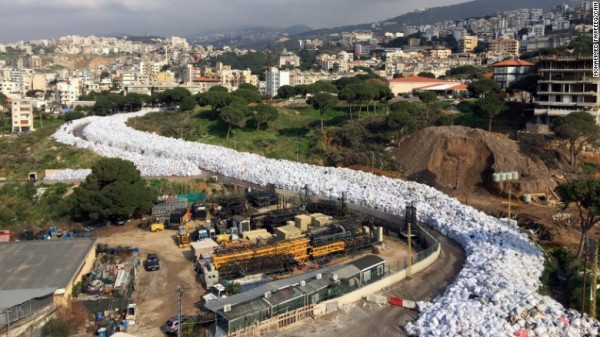
This overflowing landfill, stretching for hundreds of meters through Jdeideh in the city’s suburbs, is the consequence of the city’s months-long garbage crisis — both a symbol and a by-product of the country’s dysfunctional politics.
“This used to be such a beautiful place, but look at it now. We can’t even walk by it,” Jawanah, a local resident who only gave her own name, told CNN.
Problems began when authorities shut the main landfill site for Beirut’s garbage in July, but failed to provide an alternative.
The trash started to mount up, choking the city’s streets and sparking violent protests that saw the army deployed.
The “trash river” in Jdeideh began a few months ago when a makeshift dump began in a yard near residential buildings, and had grown since then as the garbage crisis went unresolved, local officials said.
It appeared that a solution was finally in sight when a British firm was contracted to export the waste to Russia. But the plan fell through on Friday when the company failed to submit paperwork by an agreed deadline that showed Russia would accept the garbage, a spokeswoman for Lebanon’s Council for Development and Reconstruction (CDR) told CNN.
CDR spokeswoman Mona Kalot said there was no backup plan in place.
“We don’t have a solution, but they’re working on something else,” she said.
“I don’t think it will be transferring (the trash) outside Lebanon.”
Lebanon’s trash crisis is but one among many problems blamed on the country’s stagnating politics.
Lebanon operates under a political system known as “confessional democracy,” in which political and institutional power must be distributed proportionally among its diverse religious communities.
Deadlock caused by infighting between parliament’s different factions has seen the body unable to choose a new president since May 2014, and the country also grapples with deteriorating water and electricity systems and accusations of corruption.
The garbage crisis gave rise to a popular protest movement in August calling itself “You Stink” — a moniker directed as much at the country’s political class as it was towards the garbage on the streets.
CNN

Leave a Reply
You must be logged in to post a comment.